ISLAMABAD: Local government elections in Islamabad, slated to be held in April this year, will use electronic voting machines (EVMs), Minister of Science and Technology Shibli Faraz said on Monday.
President Dr. Arif Alvi last year signed the Election (Amendment) Bill, 2021 allowing the use of EVMs in Pakistan.
Prime Minister Khan’s government has been pushing for the use of EVMs in future elections since it unveiled a prototype at the Parliament House last May. The idea of introducing EVMs — which directly record votes and are believed to prevent the irregularities that may occur during manual counting — also caught the spotlight last March after a government candidate lost a key senate seat to a joint opposition candidate, unleashing accusations of rigging and horse trading from the ruling party. A subsequent election for the post of senate chairman in April also became controversial after eight ballot papers had to be wasted by the presiding officer for breaking rules.
Opposition parties have been largely mistrustful of the government’s plans to introduce EVMs and experts have warned of large transitional costs and other technical and logistical issues. The Election Commission of Pakistan (ECP), the country’s top body responsible for carrying out elections in Pakistan, has also cast doubts over the execution of the government’s ambitious plan and the machines’ ability to ensure transparency in the electoral process.
“Alhamdulillah, I want to share with you that the debate around the EVMs has entered into another phase,” Faraz said during a press conference on Monday, announcing that EVMs would be used in Islamabad local polls. “The focus of the debate is now on how we can use the EVMs, and how to plan for it.”
He said the ECP had expressed willingness to hold Islamabad local government polls using the voting machines.
“God has given us an opportunity,” he said. “The ECP has informed us about their requirements [for the EVMs] and has also informed us about the number of machines they will need for the Islamabad local government elections.”
“Though the elections will be held in April as per law, a final date is yet to be announced,” said the minister. “The government will provide some machines to the ECP next week for trial and testing.”
Faraz said PM Khan hoped the use of EVMs would see transparent, accurate and non-controversial elections in the future in Pakistan.
“All three targets, transparency, non-controversial elections and accurate results will be achieved through the use of EVMs,” he added.
He said a massive 234,000 votes were rejected in the recently held first phase of Khyber Pakhtunkhwa local government elections last month.
“These were the wasted votes from elections held in half of Khyber Pakhtunkhwa, not even the entire province,” he observed. “The results even came late, by the next day. Had we employed the EVMs, not a single vote would have been wasted.”
Former secretary election commission Kanwar Dilshad told Arab News last year it was unlikely EMVs could be introduced by the next general election due to financial, logistical and technical constraints.
“At least an amount of Rs1 trillion is required to replace manual voting with digital voting procedures such as Electronic Voting Machines, Biometric Verification Machines or Internet voting for Overseas Pakistani in general elections,” Dilshad said, saying Rs60 billion would be required for the procurement of 350,000 EVMs alone.
“In my opinion this is a futile exercise,” he said. “The Election Commission of Pakistan pilot projects regarding EVMs have failed in the past.”
Pakistan to hold April Islamabad local polls using electronic voting machines
https://arab.news/99ts3
Pakistan to hold April Islamabad local polls using electronic voting machines
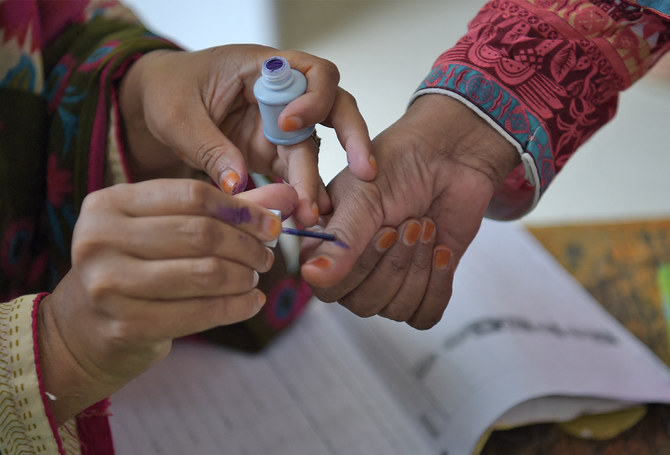
- Opposition parties have been largely mistrustful of the government’s plans on electoral reforms
- Experts have warned of large transitional costs, logistical and technical issues in using electronic voting
Pakistan’s inflation sees lowest increase in nearly two years at 17.3% in April
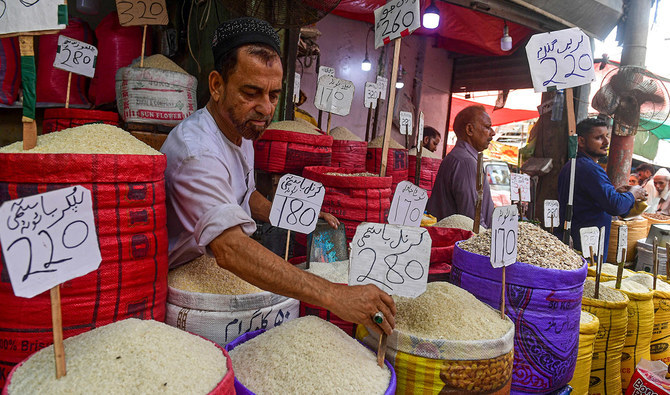
- Pakistan has been beset by inflation above 20% since May 2022, registering a high of 38% in May 2023
- Month on month inflation was down 0.4%, showing negative growth for the first time since last year in June
KARACHI: Pakistan’s Consumer Price Index (CPI) for April rose 17.3% from a year earlier, data from the Pakistan Bureau of Statistics showed on Thursday, the lowest reading in nearly two years and below the finance ministry’s projections for the month.
Pakistan has been beset by inflation above 20% since May 2022, registering a high of 38% in May 2023, as it has navigated reforms as part of an International Monetary Fund (IMF) bailout programme.
Month on month inflation was down 0.4%, showing negative growth for the first time since June 2023.
The Finance Ministry in its monthly economic report said it expected inflation to hover between 18.5% and 19.5% in April and ease further in May to 17.5%-18.5%.
Pakistan’s central bank kept its key interest rate unchanged at 22% for the seventh straight policy meeting on Monday, hours before the IMF executive board approved $1.1 billion in funding under a $3 billion standby arrangement signed last year.
The bank’s monetary policy committee said in a statement it was “prudent” to continue with its monetary policy stance at this stage to bring inflation down to the target range.
‘Well aware of our constitutional limits,’ Pakistan’s army chief declares at PAF graduation parade
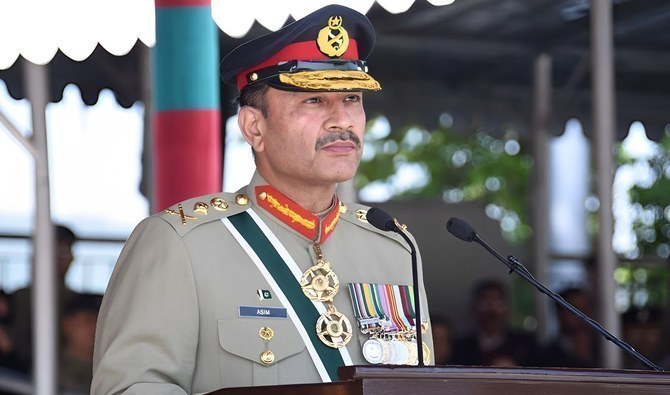
- General Asim Munir says Article 19 of Pakistan’s constitution sets limits on freedom of expression
- He says a strong air force is essential to prevent Pakistan from being at the mercy of aggressors
ISLAMABAD: Pakistan’s army chief General Asim Munir emphasized the armed forces’ awareness of their constitutional limits and expectations for legal compliance from others while addressing the graduation parade at the Pakistan Air Force (PAF) Academy in Risalpur on Thursday.
The military’s involvement in politics has been a contentious issue in Pakistan, with public criticism intensifying since the ouster of former prime minister Imran Khan in a no-confidence vote in April 2022.
The country’s military has publicly denied intentions to interfere in political affairs more recently, asserting a commitment to uphold democracy and remain apolitical, amid growing public scrutiny over its past involvements in political matters.
“We are well aware of our constitutional limits and expect others to prioritize adherence to the constitution as well,” the army chief was quoted as saying by the military media wing, ISPR, in a statement.
He said in his address to the graduating cadets that Article 19 of the Pakistani constitution set limits on freedom of expression as well.
“Those who openly violate the clear restrictions on freedom of expression set by the constitution cannot point fingers at others,” he asserted.
General Munir noted specific technologies, including artificial intelligence, robotics and quantum computing, were expanding the scope and transforming the use of air power.
However, he warned against an arms race in the region, saying it could disrupt the balance of power in and around South Asia.
The army chief pointed out that a strong air force was essential to prevent the country from being at the mercy of external aggressors.
“The recent war in Gaza is a fresh example of the miseries that wars can bring,” he said. “The indiscriminate killing of elderly, women and children in Gaza is proof that violence is increasing in the world.”
He also criticized India for its policies in the dispute Kashmir region, pointing out it would not be able to suppress the “voices of freedom” and promising continued Pakistani support on moral, political and diplomatic levels for those resisting New Delhi’s rule.
Pakistan anticipates more high-level Saudi business delegations amid stronger bilateral ties

- Foreign office says the two countries are involved in robust dialogue that has gained significant momentum
- It categorically denies reports that Pakistan is providing military bases to any foreign country against anyone
ISLAMABAD: Pakistan anticipates continued visits by high-level business delegations from Saudi Arabia in the upcoming weeks to further explore investment opportunities facilitated under the Special Investment Facilitation Council (SIFC), the foreign office announced on Thursday.
The statement came just days after Prime Minister Shahbaz Sharif concluded his visit to Riyadh, where he addressed the two-day World Economic Forum conference that began on April 28.
During his visit, Sharif met with Crown Prince Mohammed bin Salman and several Saudi ministers to strengthen bilateral relations and economic partnerships between the two nations.
Prior to his visit to the kingdom, Saudi Foreign Minister Faisal bin Farhan was in Islamabad with a large delegation, saying the Pakistani administration’s resolve to strengthen the economy would yield “significant benefits.”
“Saudi investors have been coming to Pakistan in recent months, and engaged with the SIFC in terms of exploring opportunities for Saudi investments in Pakistan, and this is an ongoing process, and we expect similar high-level business delegations to undertake visits to Pakistan in the coming days and weeks as well,” foreign office spokesperson Mumtaz Zahra Baloch told reporters in her weekly media briefing.
She added that both countries were involved in robust and mutually beneficial dialogue that had gained significant momentum in recent months.
“Pakistan and Saudi Arabia are engaged in consultations with each other in terms of increased Saudi investments in Pakistan, including in the energy domain,” she added.
Asked about reports of Pakistan providing military bases to the United States, Baloch called them baseless rumors.
“Pakistani has no plan to provide any bases to a foreign country against any other country,” she continued.
Speaking about the Organization of Islamic Cooperation’s summit in Gambia, the spokesperson said the country’s deputy prime minister Ishaq Dar would highlight the ongoing genocide in Gaza, the right to self-determination of the people of Jammu and Kashmir, the imperatives of solidarity and unity of the Muslim Ummah, rising Islamophobia, issues of climate change, terrorism, and other contemporary global challenges.
She said Pakistan strongly condemned the escalating violations of human rights by Israel and increasing number of illegal Israeli settlements in the West Bank.
“Israel’s actions constitute a breach of international law, including humanitarian laws and other pertinent international laws, and these acts also undermine any prospects of a two-state solution,” she added.
Pakistan vows ‘foolproof security’ for Chinese nationals after militant attacks
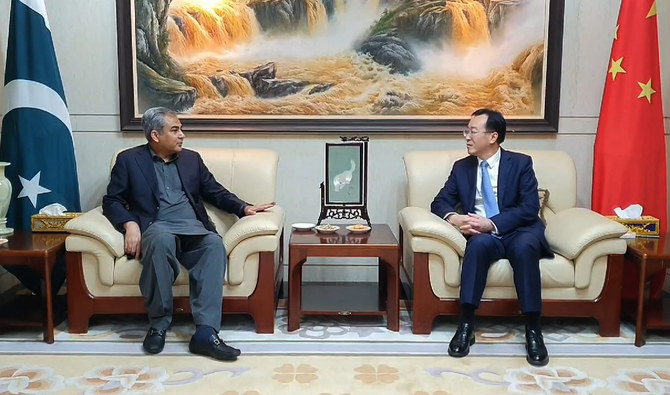
- Interior minister says government implementing strict security protocols for safe movement of Chinese workers
- A suicide bomber targeted a convoy of Chinese nationals near Dasu earlier this year, killing five of them
ISLAMABAD: Pakistan’s interior minister Mohsin Naqvi said on Thursday the government would ensure “foolproof security” for Chinese nationals following militant attacks targeting them in the country where most of them have been working on infrastructure development projects.
Naqvi made this assurance during his visit to the Chinese consulate in Karachi, where he discussed the issue in his conversation with a top diplomat Yang Yuandong, who welcomed the minister to the facility.
Five Chinese nationals were killed earlier this year in March after a suicide bomber rammed an explosives-laden vehicle into their convoy which was on its way from Islamabad to the site of a key hydroelectric dam in Dasu.
Prior to that, Chinese workers also came under attack by Baloch separatists near the Gwadar port. The incident led to the death of eight militants.
“It is our duty to ensure foolproof security for Chinese citizens,” Naqvi said during the during his visit to the consulate. “Strict implementation of standard operating procedures for safe movement of Chinese citizens is being ensured.”
Pakistan took action against a number of senior officials after the Dasu attack, saying they showed negligence and had failed to follow the security protocol.
He said the “enemy” wanted to undermine the China-Pakistan friendship but would not succeed.
According to a statement circulated by the ministry, the Chinese diplomat expressed satisfaction with the overall security plan for the protection of the Chinese workers.
Pakistan’s cricket body names 18-player squad for T20I series against England, Ireland
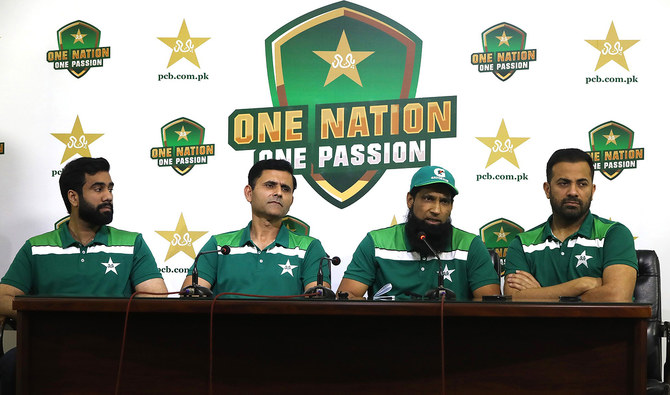
- A 15-player squad for the ICC Men’s T20 World Cup will be announced before the May 24 deadline
- Fast bowler Haris Rauf along with all-rounders Hasan Ali and Salman Ali Agha have been recalled
ISLAMABAD: The Pakistan Cricket Board (PCB) on Thursday announced the 18-player squad for the upcoming T20I series against Ireland and England & Wales beginning on May 10 and continuing till the end of the month.
According to a PCB statement, the squad will be reduced to 15 players for next month’s ICC Men’s T20 World Cup 2024 after the first T20I at Leeds on 22 May to meet the ICC’s 24 May deadline.
The men’s national selection committee has recalled fast bowler Haris Rauf, along with all-rounders Hasan Ali and Salman Ali Agha, in the 18-player squad.
The two cricketers who did not make the cut from the original 17-player squad that faced New Zealand are wrist spinner Usama Mir and fast bowler Zaman Khan.
“Crafting this squad was a challenging task due to the outstanding talent available,” the PCB selection committee was quoted in the statement. “After thorough deliberation and considering various cricketing aspects, we have finalized 18 players.”
“The squad encompasses a robust top-order featuring Babar Azam, Fakhar Zaman, Mohammad Rizwan, Saim Ayub and Usman Khan; an effective middle-order with Azam Khan, Iftikhar Ahmed and Muhammad Irfan Khan; versatile all-rounders in Imad Wasim, Shadab Khan and Salman Ali Agha; a pace battery led by Mohammad Abbas Afridi, Mohammad Amir, Naseem Shah, Haris Rauf, Hasan Ali and Shaheen Shah Afridi; and the spin prowess of Abrar Ahmed,” it continued.
“We understand Usama and Zaman will be disappointed and they should be as they must be looking ahead to the tours of Ireland and England,” the statement added. “They are quality cricketers and have long careers ahead of them. They need to continue to focus on their cricket so that they are available, if required.”
Haris Rauf and wicketkeeper-batter Azam Khan were sidelined for the New Zealand T20Is due to injuries, while middle-order batter Muhammad Irfan Khan and wicketkeeper-batter Mohammad Rizwan were rested from the two T20Is in Lahore due to niggles.
The four cricketers underwent fitness assessments at the National Cricket Academy on Tuesday afternoon, showing significant improvement.
The team is scheduled to depart for Dublin on May 7 following a three-day training camp in Lahore.










